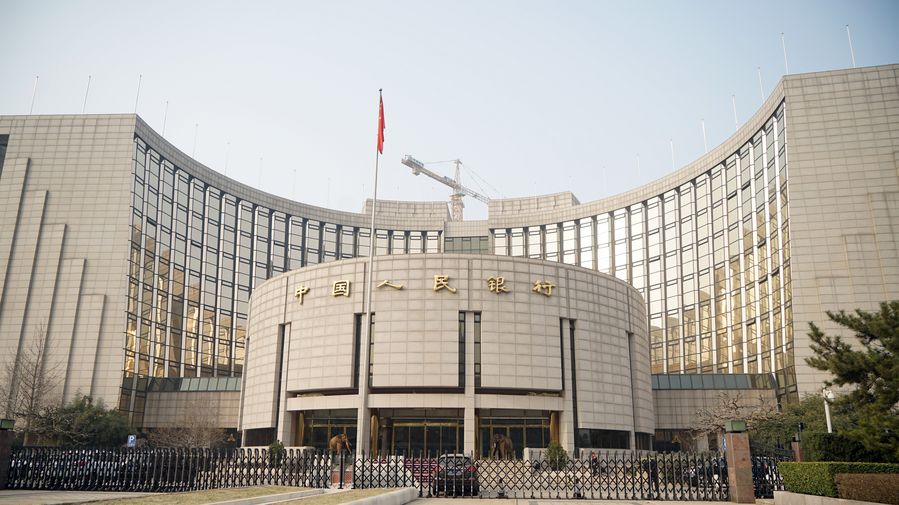Editor's note: Tom Fowdy is a British political and international relations analyst and a graduate of Durham and Oxford universities. He writes on topics pertaining to China, the DPRK, Britain and the U.S. The article reflects the author's opinions, and not necessarily the views of CGTN.
On August 13, Yu Yongding, a former member of the monetary policy committee of the People's Bank of China and a senior fellow in the Chinese Academy of Social Sciences (CASS) warned that Beijing must be prepared for what he described as a potential "worst case scenario" and "a series of threats from the U.S." as tensions rise in the form of potential cut off or leveraging from the U.S. dollar system via financial sanctions or restrictions.
He stated future measures could come in a "number of forms" including the blacklisting of banks, risk of fines, severing of capital or lending or even the seizure of Chinese assets. Given the climate, he warned that "this possibility can't be ruled out."
As hostilities from Washington grow, the risks of such sanctions are very real. On August 7, the Trump administration sanctioned a number of Hong Kong officials over what they cited as an erosion of autonomy in the city.
The recently signed Hong Kong Autonomy Act allows the U.S. to go further and punish banks who deal with the blacklisted individuals, which can ban them from capital markets or impose fines upon them. This makes the impact of U.S. measures, with more likely to come, not as simple as "whether one does business in America or not" but rather illustrates the hegemony of the dollar by creating risk for all financial institutions who do business with those listed.
Although on a rational level a removal of China from the U.S. dollar system seems unlikely and would be catastrophic for the global economy and America itself, nevertheless Yu's comments highlight the obvious and growing risks, with him noting Trump's "shameless" behavior over TikTok as a measure of what could arise.
Ultimately, worst case scenario planning accelerates the incentive and strategic need for the country to diversify from its dependency on the U.S. dollar. Whilst there is much to be done, China's officials are clearly taking note of this scenario, with moves to strengthen the Chinese yuan's international role, establish a new digital currency and accelerate the use of other currencies in cross-border transactions all underway. The clock is ticking.
First of all, China's banks and own financial system is strengthening the role of the yuan as an international investment and commodity currency. On August 14, the People's Bank of China released its 2020 yuan internationalization report and stated, "We will continue to steadily promote the yuan internationalization to serve the real economy, based on market principles".

The headquarters of the People's Bank of China. /Xinhua
The headquarters of the People's Bank of China. /Xinhua
The bank making it easier for foreign investors to use the renminbi to invest in local bonds and stocks and will promote the development of offshore yuan markets. This has gone alongside world leading efforts to create a "central bank digital currency" or "digital yuan" which is now being trialed in Tianjin, Hebei, the Yangtze River Delta region and Guangdong. The currency could drastically change the game of global finance.
There are also meaningful movements underway to minimize the U.S. dollar's role in cross-border transactions and exchanges. Aided by Russia's concurrent ambition to move beyond the dollar, from 2019 to 2020 the euro overtook the U.S. dollar for the first time in China-Russia trade, the greenback had previously accounted for 87 percent of such transactions in 2018, but has now shrunk to 33 percent by 2020 with the euro occupying a 50.8 percent share.
In addition, just last week China waived forex transaction fees for 12 currencies including the Russian rouble, the Singaporean dollar, the South Korean won, the South African rand, Saudi riyal and the Thai baht amongst others. China's State Administration of Foreign Exchange stated the move was to "actively cooperate with the Belt and Road Initiative development strategy."
Nevertheless, there is a long way to go. The United States continues to dominate the global financial and capital system and its major commodity markets. In many respects, China will continue to rely on such markets and it will remain in its national interest to do so.
However, Washington ought to be mindful that abusing this system too extensively will also risk undercutting their global influence by hastening global diversification. Although Yu Yongding noted the U.S. has most of the cards on this matter, attempting to forcefully use this system against China would arguably be one of the fastest ways to simply undercut its globalization.
This seems unlikely, but with the Trump administration one is never so sure to hedge their bets. As a result, there is ample evidence China is "preparing for the worst case scenario" and "hedging" against total dollar dependency, a change is already in motion regardless.
(If you want to contribute and have specific expertise, please contact us at opinions@cgtn.com.)